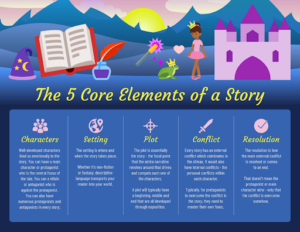Many people have the habit of quitting even before they start properly. Writers also fall into this category and they fail to recognize their full potential. New writers often burden themselves with the expectation of producing a publishable story on their first attempt.
The journey to becoming a published writer is a bumpy road with many challenges. Many think that writing is an innate talent, but in reality, it can also be cultivated through practice, patience, and hard work.
As a new writer, you will be more prone to making mistakes that keep your story far from getting approved.
Here are some common mistakes and how you can avoid them to become better at delivering your story to the audience.
Start with a Weak Introduction
As a writer, your first impression of the story should be strong enough to keep the reader hooked. Often writers make the mistake of starting with a long description of a scene like dreaming about something and then waking up from it.
Unless the long introduction gives information about the main character or the story, it serves no basis. Readers will turn pages when you deliver the character more strongly.
Weak Knowledge of the Genre
According to the genre you choose to write the story in, the rules can be different in many aspects. Some writers don’t comply with it and end up with a manuscript length that does not fit into the category.
The purpose of categorizing novels into genres is to make it easy for publishers to market the books. It helps them decide where to place the books on the shelves. For writers who are going for a cross-genre book, decide under which category you wish to place the books to market them well.
Unclear Story Plot
When a writer crafts a story, the plotting is the first step and it is often the most challenging. If your story doesn’t have a strong plot, it will confuse the readers even more.
Some writers may think that a series of events may equal a plot but that should not be the case. To write a page-turner story, create a beginning, middle, and end of a plot. The basic elements of a good plot are exposition, rising action, climax, falling action, and resolution. You can learn more with the help of an infographic from venngage.com on how to create a page-turner story.

Creating Inconsistent Characters
The main character of the story should have consistent characterization so that readers can attribute a certain personality to it. If at one moment the character is brave and at the next, he is a coward, the readers will have a hard time getting a sense of which adjectives fit the character best.
You can write character profiles to help shape the story characters into distinct figures. After creating a storyline, write a page of the backstory of the main character’s relationships, deepest insecurities, and how they would react in a certain situation. Give your characters the same level of depth that makes them feel like real people.
Not Revising Enough Before Publishing
New writers may not realize the importance of getting their novels revised multiple times before getting published. They wish to get done with it fast to move on to the next one without realizing writing mistakes and how to avoid them in their next writing.
Make sure to get feedback from senior writers and wait a few months before the actual revisions to create a selling story. You can look online for proofreaders for hire to get your manuscript spotless and ready to be published.
Lack of Research on Publishers
It is common for new writers to shoot for as many agents or publishers as possible in hope that any one of them will accept the offer. But doing this does not always guarantee success. Try to take a more targeted approach to increase your chances of getting approved by at least one publisher or agent.
You need to narrow down the publisher list by looking for those who publish in your genre. Check online and see what kinds of manuscripts are being sought by the agents at the moment.
Unrealistic Expectations About Publishing
As a new writer, you need to develop a realistic approach when it comes to publishing your article. Most debut writers dream about earning six figures from the novel and getting adapted into a TV series. To be successful you need to keep pushing forward even if you fail at times.
In your early phase of writing, you may face a hundred rejections until an agent will be ready to represent you. Even if your first book ends up being published, it may not sell enough copies and your publisher might drop you.
But this doesn’t mean that you should stop dreaming, instead set up realistic expectations to avoid disappointment in the long run. Even though having a full-time profitable writing career is difficult, it is not impossible.
Failing to Deliver the Right Emotions
If your story fails to bring out the right emotions in the readers then it has more issues as well. It lacks a narrative voice and detailed characterization. The writer should give the reader more information so that they could come to their conclusion regarding the situation.
Oftentimes new writers go for general words since they are not familiar much with vocabulary. They miss the opportunity to use specific details for stronger emotions.
Your story can grab the attention of the readers if you carefully choose the words, sentence structure, and rhythm to create the perfect emotion. Try to deliver the feelings through the characters’ words and actions.
Not Knowing About the Audience
The story will not sell well in the market if you don’t write it according to your audience. Before you start creating a plot, identify which age group your target audience falls into and what attracts them to a story.
Don’t make the mistake of mixing up different genres and saying that it will appeal to readers of all ages. Most readers look for a general idea of what they can expect from the book. Similarly, agents need to know the specific genre so that they can pitch the book to the publishers successfully.
So create your story around a primary genre and decide the age range of readers who will enjoy it the most.
